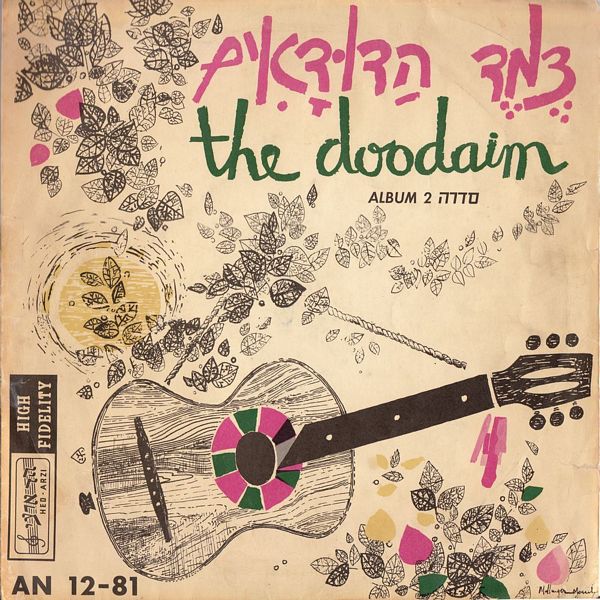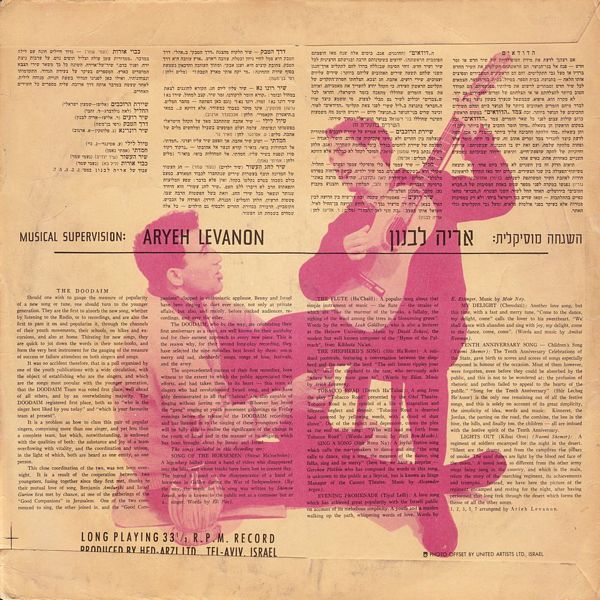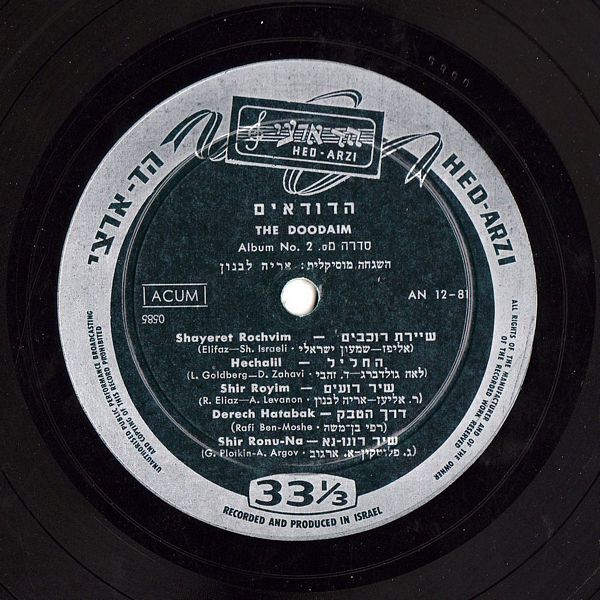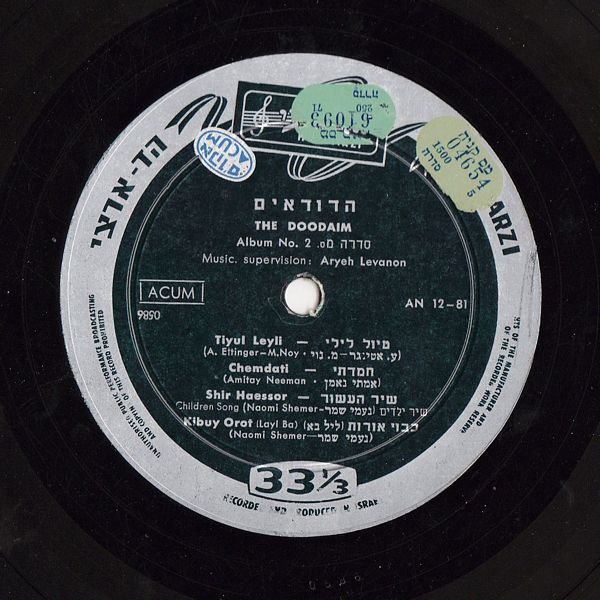

 |


 |
THE DOODAIM
Should one wish to gauge the measure of popularity of a new song or tune, one should turn to the younger generation. They are the first to absorb the new song, whether by listening to the Radio, or to recordings, and are also the first to pass it on and popularize it, through the channels of their youth movements, their schools, on hikes and excursions, and also at home. Thirsting for new songs, they are quick to jot down the words in their note-books, and form the very best instrument for the gauging of the measure of success or failure attendent on both singers and songs.
It was no accident therefore, that in a poll organised by one of the youth publications with a wide circulation, with the object of establishing who are the singers, and which are the songs most popular with the younger generation, that the DOODAIM Team was voted first place, well ahead of all others, and by an overwhelming majority. The DOODAIM registered first place, both as to "who is the singer best liked by you today" and "which is your favourite team at present".
It is a problem as how to class this pair of popular singers, comprising more than one singer, and yet less than a complete team, but which, notwithstanding, is endowed with the qualities of both: the substance and joy of a team overflowing with vitality and the coordination and unison, in the light of which, both are heard as one entity, as one person.
This close coordination of the two, was not born overnight. It is a result Of the cooperation between two youngsters, fusing together since they first met, thanks to their mutual love of song. Benjamin Amdurski and Israel Gurion first met by chance, at one of the gatherings of the "Good Companions" in Jerusalem. One of the two commenced to sing, the other joined in, and the "Good Companions" clapped in enthusiastic applause. Benny and Israel have been singing in duet ever since, not only at private affairs, but also, and mainly, before packed audiences, recordings, and over the ether.
The DOODAIM, who by the way, are celebrating their first anniversary as a team, are well known for their assiduity and for their earnest approach to every new piece. This the reason why, for their second long-play recording, they have selected the nine melodies best loved by them: songs merry and sad, shepherds' songs, songs of love, festivals, and the army.
The unprecedented success of their first recording, bore witness to the extent to which the public appreciated their efforts, and had taken them to its heart — this team of singers who had revolutionised Israeli song, and who have ably demonstrated to all that "Sabras" are also capable of singing without jarring on the senses. Whoever has heard the "gang" singing at youth movement gatherings on Friday evenings before the release of the DOODAIM recordings, and has listened in to the singing of these youngsters today, will be fully able to realise the significance of the change in the youth of Israel and in the manner of its singing, which has been brought about by Benny and Israel.
The songs included in this recording are:
SONG OF THE HORSEMEN (Shirat Ha'rochvim): A legendary ballad about a band of riders who disappeared into the hills, and whose tracks have been lost to present day. The legend is based on the disappearance of a band of horsemen in Galilee during the War of Independence. (By the way, the music for this song was written by Shimon Israeli, who is known to the public not as a composer but as a singer. Words by Eli Paz).
THE FLUTE (Ha'Chalil): A popular song about that simple instrument of music — the flute — the strains of which are "like the murmur of the brooks, a lullaby, the sighing of the wind among the trees in a blossoming grove". Words by the writer Leah Goldberg, who is also a lecturer at the Hebrew University. Music by David Zehavi, the modest but well known composer of the "Hymn of the Palmach", from Kibbutz Na'an.
THE SHEPHERD'S SONG (Shir Ha'Roim): A subdued pastorale, featuring a conversation between the shepherd and the ram of the herd. "The soft breeze ripples your back" says the shepherd to the ram, who nervously asks "where has my mate gone to". (Words by Eliaz, Music by Arieh Levanon).
TOBACCO ROAD (Derech Ha'Tabac): A song from the play "Tobacco Road" presented by the Ohel Theatre. Tobacco Road is the symbol of a life of stagnation and idleness, neglect and despair. "Tobacco Road is deserted land covered by yellowing weeds, with a cloud of dust above". Out of the neglect and depression, comes the plea at the end of the song: "Who will lead me forth from Tobacco Road". (Words and music by Raji Ben-Moshe).
SING A SONG (Shir Ronu Na): A joyful festive song which calls the merrymakers to dance and sing "the song calls to dance, sing a song, the measure of the dance, sing folks, sing and be merry" (here too, we have a surprise — Gershon Plotkin who has composed the words to this song, is unknown to the public as a lyricist, but is known as Stage Manager of the Cameri Theatre. Music by Alexander Argov).
EVENING PROMENADE (Tiyul Leili): A love song which has achieved great popularity with the Israeli public on account of its melodious simplicity. A youth and a maiden walking up the path, whispering words of love. Words by E. Ettinger. Music by Meir No'y.
MY DELIGHT (Chemdati): Another love song, but this time, with a fast and merry tune. "Come to the dance, my delight, come" calls the lover to his sweetheart. "We shall dance with abandon and sing with joy, my delight, come to the dance, come, come". (Words and music by Amitai Neeman).
TENTH ANNIVERSARY SONG — Children's Song (Naomi Shemer): The Tenth Anniversary Celebrations of the State, gave birth to scores and scores of songs especially composed in honour of the occasion. Most of them however, were forgotten, even before they could be absorbed by the public, and this not to be wondered at: the profusion of rhetoric and pathos failed to appeal to the hearts of the public." "Song for the Tenth Anniversary" (Shir Lechag He'Assor) is the only one remaining out of all the festive songs, and this solely on account of its great simplicity, the simplicity of idea, words and music: Kinneret, the Jordan, the parting on the road, the combine, the bee in the hive, the hills, and finally too, the children — all are imbued with the festive spirit of the Tenth Anniversary.
LIGHTS OUT (Kibui Orot) (Naomi Shemer): A regiment of soldiers encamped for the night in the desert. "Silent are the drums, and from the campfires rise pillars of smoke. The sand dunes are light by the blood red face of the moon." A mood song, so different from the other army songs being sung in the country, and which in the main, relate the story of the marching regiment, its achievements and triumphs. Instead, we have here the picture of the regiment encamped and resting for the night, after having performed that long trek through the desert which forms the theme of all the other songs.